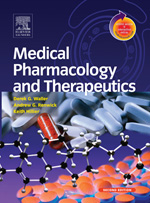This book covers the whole gamut of pharmacology from basic science
pharmacology and pathophysiology, through clinical pharmacology to
therapeutics. This integrative approach is in line with the new
medical curricula. The first section covers the basic principles,
followed by the bulk of the book organised by body systems. The book
ends with sections on toxicity and prescribing practice. Each chapter
ends with case histories, multiple choice questions and a tabular
presentation of all common drugs within a particular class.
The level of detail closely matches the needs of medical students and
the current medical curriculum.
Features
*Integrates basic science pharmacology, clinical pharmacology and
therapeutics
*Brief review of pathophysiology of major diseases
*Case histories and multiple choice questions (and answers)
*Tabular presentation of all common drugs within each class
*Section on further reading
*Full-text available on www.studentconsult.com
-Contents-
General Principles. Sites and mechanisms of drug action.
Pharmacokinetics. Drug discovery, evaluation and safety. The nervous
system, neurotransmission and the peripheral nervous system.
Cardiovascular system. Ischaemic heart disease. Hypertension. Heart
failure. Cardiac arrhythmias. Cerebrovascular disease and dementia.
Peripheral vascular disease. Haemostasis.
Respiratory system. Asthma and chronic obstructive pulmonary disease.
Other respiratory problems.
Renal system. Diuretics. Disorders of micturition. Erectile
dysfunction.
Nervous system. General anaesthetics. Local anaesthetics. Opioid
analgesics. Anxiolytics, sedatives and hypnotics. Psychotic
disorders. Depression. Epilepsy. Extrapyramidal movement disorders
and spasticity. Other neurological disorers. Migraine.
Musculoskeletal system. Neuromuscular blockade. Myasthenia gravis.
NSAIDs. Inflammatory arthritis. Hyperuricaemia and gout.
Gastrointestinal system. Nausea and vomiting. Dyspepsia and peptic
ulcer disease. Inflammatory bowel disease. Constipation, diarrhoea
and IBS. Obesity.
Immune system. The immune response and immunosuppressant drugs.
Antihistamines and allergic disease.
Endocrine system and metabolic disease. Diabetes mellitus. Thyroid
disease. Calcium metabolism. Pituitary and hypothalmic hormones.
Corticosteroids. Female reproductive system. Androgens and anabolic
steroids. Anaemia. Lipids.
Skin and eye disorders. Skin disorders. Eye disorders
Chemotherapy. Chemotherapy of infection. Chemotherapy of malignancy.
Drug toxicity and prescribing. Drug toxicity and overdose. Drug abuse
and dependence. Prescribing, adherence and information for patients.
Drug therapy in special situations.
-Author Informtion-
Cardiovascular Physician, Southampton General Hospital; Senior
Lecturer in Medicine and Clinical Pharmacology, University of
Southampton, Southampton, UK;
Andrew G. Renwick, OBE, BSc, PhD, DSc, Emeritus Professor of
Biochemical Pharmacology, School of Medicine, University of
Southampton, UK;
Keith Hillier, BSc, PhD, DSc, Senior Lecturer in Pharmacology,
University of Southampton Medical School, Southampton, UK


